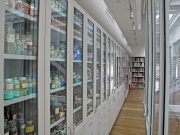Difference between revisions of "Forbes Pigment Database"
Rcouseillant (talk | contribs) |
Rcouseillant (talk | contribs) |
||
(22 intermediate revisions by the same user not shown) | |||
| Line 6: | Line 6: | ||
Inventory lists and analysis results for the pigments are being added to the database as they are received. The pigment sets have varying numerical designations and limited bottle labeling. Where it appears that more than one lab has portions of the same sample (based on the number or label), the records are combined. The most common numbering systems are: 1) the 'new' system devised by Richard Buck based on the pigment’s color and chemical composition and 2) the 'old' or original numbers from the NYU collection. All numbers associated with a particular sample are included in the Pigment number field for searching purposes. | Inventory lists and analysis results for the pigments are being added to the database as they are received. The pigment sets have varying numerical designations and limited bottle labeling. Where it appears that more than one lab has portions of the same sample (based on the number or label), the records are combined. The most common numbering systems are: 1) the 'new' system devised by Richard Buck based on the pigment’s color and chemical composition and 2) the 'old' or original numbers from the NYU collection. All numbers associated with a particular sample are included in the Pigment number field for searching purposes. | ||
| − | + | [[[PigmentsContents]]] | |
| + | [[Category:Reference Collections]] | ||
= Institution list = | = Institution list = | ||
Revision as of 11:16, 8 February 2022
The Forbes’ Pigment Collection contains over 3000 colorants assembled by the late Edward Waldo Forbes, former Director of the Fogg Art Museum at Harvard University (1909-1945). Currently, the core collection of pigments is housed in the Straus Center for Conservation at Harvard University while Forbes’ private collection of pigments resides at the Institute for Fine Arts Conservation Center at New York University. Contents of both collections were shared during his lifetime and after. Known subsets of these two collections exist in several additional laboratories around the world (see bottom of page for institution list). These colorants have been analyzed widely by most of the labs and thus the goal of this database is to provide one central, searchable, readily-accessible location for the compilation of any available information from all sources. The combination of this information will document the materials and aid in the determination of their compositions.
Database setup
Inventory lists and analysis results for the pigments are being added to the database as they are received. The pigment sets have varying numerical designations and limited bottle labeling. Where it appears that more than one lab has portions of the same sample (based on the number or label), the records are combined. The most common numbering systems are: 1) the 'new' system devised by Richard Buck based on the pigment’s color and chemical composition and 2) the 'old' or original numbers from the NYU collection. All numbers associated with a particular sample are included in the Pigment number field for searching purposes.
Institution list
While this list may not be comprehensive, the following institutions are recognized as having subsets of these two collections. Additionally, many institutions further developed their collections with additional materials. One significant set is a collection of Asian pigments produced by Rutherford Gettens, Fogg Art Museum, and Richard Buck, Intermuseum Conservation Laboratory. This collection now resides at the Asian Art Museum in San Francisco and small subsets exist in other labs.
Forbes' core collection: •Straus Center for Conservation (formerly the Fogg Art Museum) Harvard University Art Museums, Cambridge MA • Art Institute of Chicago, Chicago IL • Balboa Art Conservation Center, San Diego CA • Edson Motta, Rio de Janeiro, Brazil • Freer Gallery of Art, Washington DC • Institute of Fine Arts, Conservation Center, New York University, New York, NY • Intermuseum Conservation Laboratory, Cleveland OH (formerly Oberlin OH) • Philadelphia Museum of Art, Philadelphia PA • Yale University Art Gallery, New Haven CT
Forbes' private collection: •Institute of Fine Arts, Conservation Center, New York University, New York NY • Art Conservation Research Center, Carnegie Mellon University, Pittsburgh PA • Brooklyn Museum, Brooklyn, NY • Buffalo State College Art Conservation Department (formerly the Cooperstown Graduate Programs), Buffalo NY •Detroit Institute of Arts, Detroit MI • Doerner Institute, Munich, Germany • Intermuseum Conservation Laboratory, Oberlin OH •Library of Congress Restoration Office, Washington DC •McCrone Research Laboratory, Chicago, IL • Metropolitan Museum of Art, New York NY • Museum of Fine Arts, Boston MA • National Gallery of Canada, Ottawa, Ontario, Canada • National Research Laboratory for Conservation, New Delhi, India • University of Stellenbosch, Stellenbosch, South Africa •Walters Art Gallery, Baltimore MD •Winterthur Museum, Winterthur DE
- Reference Collections
- Forbes Pigment Labs: SCC-Cambridge MA
- Forbes Pigment Labs: ICA-Cleveland
- Forbes Pigment Labs: PMA
- Forbes Pigment Labs: IFA-NYU
- Forbes Pigment Labs: Brooklyn Museum
- Forbes Pigment Labs: Buffalo State
- Forbes Pigment Labs: DIA-Detroit
- Forbes Pigment Labs: Library of Congress
- Forbes Pigment Labs: McRI-Chicago
- Forbes Pigment Labs: MFA-Boston
- Forbes Pigment Labs: Walters-Baltimore
- Forbes Pigment Labs: Winterthur
